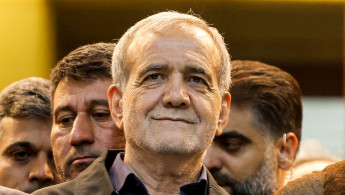Rights group calls on new Iran President Pezeshkian to 'confront' breaches of rights
Human Rights Watch (HRW) has called on Iran's new president to "confront" widespread rights breaches by government agencies like the security forces and judiciary.
Masoud Pezeshkian, considered a reformist, was elected on 5 July and will take up the position in the coming weeks.
The previous president, Ebrahim Raisi, died in a helicopter crash in May.
"Incoming Iranian President Masoud Pezeshkian should confront Iran's egregious human rights abuses, including alarming rates of executions, systemic oppression of women, and brutal repression of ethnic and religious minorities," Nahid Naghshbandi, acting Iran researcher at HRW, said in a press release.
"Ending impunity for these injustices is essential for Pezeshkian to show Iranians that the government can address their legitimate, widespread grievances and demands for fundamental change."
The Shargh newspaper said turnout in the first round of the election was 39.96 percent, the lowest ever, however, this figure rose to 49.8 percent in the second round of voting.
The election was boycotted by a considerable number of people and civil society groups.
"The elections were neither free nor fair. Before the election, the Guardian Council, a body of 12 male religious jurists and legal experts responsible for vetting candidates, disqualified many candidates without providing a reason, including several prominent government officials," HRW said.
The global rights watchdog said the "Woman, Life Freedom" protest movement that began in 2022 following the death of Iranian woman Mahsa Amini and the government's "brutal response" have "highlighted the dire state of human rights".
It added that a recent Amnesty International report said Iran executed 853 people last year, the most for eight years, with 481 of these for drug-related offences.
As of 20 March, at least 95 executions had been recorded this year.
The Baluch ethnic minority makes up five percent of the country's population but represented 20 percent of those executed last year.
The Iranian penal code also criminalises failure to wear "proper" hijab.
Women accused of breaching the law can be punished with up to two months' jail time and fines, with HRW saying this breaches their rights to privacy and non-discrimination.
"Regarding hijab, we should not enforce it in a way that leads to dissatisfaction," incoming President Pezeshkian said during a debate in June.
"Even with coercion, we cannot force our children and grandchildren into something."
Naghshbandi said more is needed to restore trust with people in Iran than promises that have been unfulfilled for years.
"It demands immediate, tangible action to improve the human rights of people across the country," she said.
"A meaningful first step would be for Pezeshkian to order the release of all detained activists, peaceful protesters, and human rights defenders, who never should have been jailed in the first place."





 Follow the Middle East's top stories in English at The New Arab on Google News
Follow the Middle East's top stories in English at The New Arab on Google News
![Netanyahu furiously denounced the ICC [Getty]](/sites/default/files/styles/image_330x185/public/2024-11/GettyImages-2169352575.jpg?h=199d8c1f&itok=-vRiruf5)
![Both Hamas and the Palestinian Authority welcomed the ICC arrest warrants [Getty]](/sites/default/files/styles/image_330x185/public/2024-11/GettyImages-2178351173.jpg?h=199d8c1f&itok=TV858iVg)
